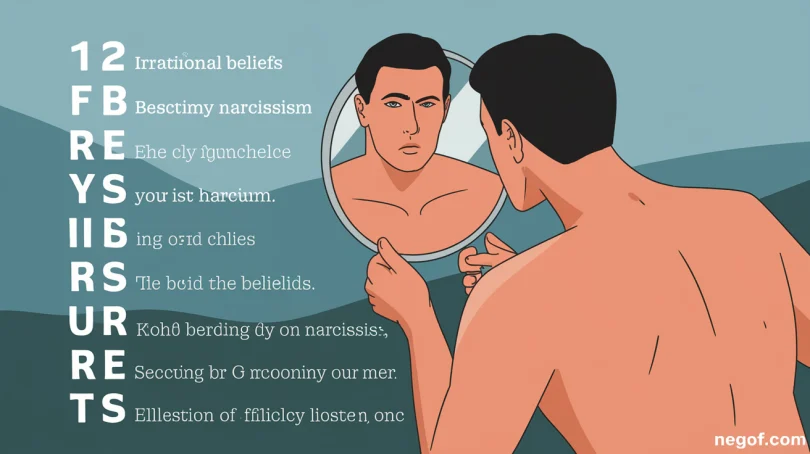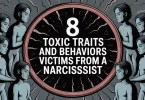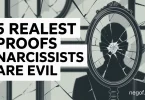Today I’m going to go a bit old school. I’m going to be looking at narcissistic personality through the 12 irrational beliefs as set out by Albert Ellis. Now, these are beliefs that tend to be unrealistic and often lead to emotional distress, anxiety, and dysfunctional behaviors in people.
They’re considered irrational because they can contradict reality and hinder growth. But to be fair, we can all have these beliefs from time to time and in certain situations. Quite often, these beliefs are explored in therapy. Narcissists, however, tend to be resistant to anything that they would consider to be criticism, and exploration of their beliefs could be interpreted as criticism, which causes their maladaptive defense mechanisms to kick in.
Because when it comes to narcissistic personality, what we typically see is absolutist, rigid, all-or-nothing thinking with little to no room for context and nuance. The only time there are exceptions is whenever the exception applies to them, for instance, they are entitled to and deserving of special treatment due to their unique status.
Belief 1: Need for Universal Approval
So, looking at belief number one: I must be loved or approved of by everyone I consider significant. Now, quite often when we think of self-esteem, it’s not really what I think of myself, but what I believe others think of me. So, this belief assumes that approval is necessary for self-worth, which can be unrealistic because many people are going to have varying opinions.
Also, chances are you’re going to meet a lot of folk who are always going to be critical; there’s just no pleasing them. With narcissism, however, what we see is a belief that they deserve universal adoration and a need for constant admiration, and they can react with rage or insecurity if they don’t get it.
They might see a lack of approval as a personal attack on their perceived superiority, and they demand constant validation just to maintain their grandiose self-image. Anyone who doesn’t validate their self-delusions is bad.
Related Topics:
6 Signs A Break-Up Might Be Good For You
Malignant Narcissist Vs Narcissist: How To Spot The Difference
The ONE THING That Terrifies Narcissists
Belief 2: Must Excel at Everything
I must be good at everything. Now, this usually comes through a fear of criticism, but this belief ignores the fact that no one is brilliant at everything, and that mistakes are part of being human. But narcissists, as I previously said, are highly resistant to criticism, and they tie their self-worth to being the best at everything.
Any failure can be catastrophic, and they generally don’t do well with humility. So, the thought of others being better at something can trigger their envy and their competition, and quite typically, they exaggerate their achievements as well as belittle others to maintain an illusion of flawless brilliance. Quite often, they struggle with just being average.
Belief 3: Labeling Others as Bad
Certain people are bad, wicked, or villainous, and they should be punished. Now, this belief oversimplifies human behavior; it ignores context as well as the potential for change. If left unchecked, it can also foster anger or resentment.
Narcissistic people tend to label anyone who criticizes or challenges them as being bad or jealous, and they deserve to be punished or ostracized. And this all-or-nothing thinking protects their fragile ego by externalizing blame as well as devaluing others.
A common phrase used in the context of narcissism is scapegoat, In other words, they need something or someone to blame for their shortcomings.
Belief 4: Catastrophizing Setbacks
It’s awful and catastrophic whenever things are not the way I want them to be. Now, this mindset exaggerates the negative impact of some situations and can lead to unnecessary distress. It fuels anxiety; it could be a fear of lacking control over something important to us, but it also ignores our resilience and our ability to adapt.
Narcissistic people expect the world and everyone in it to conform to their wishes, and any deviation from their desires is unfair. Setbacks can be seen as some kind of personal injustice; the word “no” could be seen as some kind of personal attack, and they can throw tantrums or manipulate situations just to try to regain control.
Belief 5: External Causes of Unhappiness
Irrational belief number five is that human unhappiness is caused by external events, and I have little or no ability to control my emotions. Now, this can be a fear that the locus of control is always external, but it denies personal responsibility for our reactions. And narcissists often blame circumstances or other people for their emotional distress because, to a narcissist, the problem always lies outside of themselves.
Now, they might claim something like, “you made me do it,” just to justify their outbursts, but this denies their role in their behavior. They refuse to take responsibility for their actions, so if the problem lies outside of themselves, then so does the solution; other people have to conform to make them happy.
Belief 6: Obsession with Threats
If something is or may be dangerous, then I must be preoccupied with it and constantly be on guard. Now, this belief can fuel anxiety and has people ruminate and catastrophize rather than problem-solve. For instance, the fear of being rejected can have people constantly scanning other people for signs of disapproval.
Narcissistic people, however, can obsess over their status or threats to their status, their reputation, or their image. They might fear either someone taking the spotlight from them, or maybe they fear being exposed as being less than perfect, and their hypervigilance can fuel their paranoia about other people’s motives. They see criticism or betrayal everywhere; they assume that others think, behave, and have the same motives they do.
Belief 7: Avoiding Responsibility
It’s easier to avoid life’s difficulties and responsibilities than to have to face them. Now, I’m a big fan of don’t make things too difficult for yourself, but the path of least resistance rarely takes you where you want to go.
It often leads to longer-term hardship and misery, and this belief often lies behind procrastination, which generally ends up making things worse. Narcissists, however, generally avoid responsibility and accountability; some may even avoid challenging tasks in case they risk failure.
They prefer to maintain a grandiose facade, so what they might do is they might delegate responsibilities to other people and blame them for the failure, or take credit for the success.
Belief 8: Dependency on Others
I need someone or something stronger or greater than me, just to rely on. Now, to be fair, all of us require help, support, or advice from time to time because we don’t know everything, and we can’t do everything. But this belief can come from a fear of, whatever it is, I’m not enough, I don’t have enough, I can’t do enough, and it can foster dependency, undermine self-efficacy, and the ability to problem-solve.
Now, while grandiose narcissists often appear overly confident and self-reliant, they still depend on others for their narcissistic supply; they need it to sustain their self-image. And with covert narcissism, we commonly see a sense of helplessness and victimhood, and they exploit relationships just to feel powerful. They need constant external validation just to feel secure.
Belief 9: Past Determines Future
The past determines the present and the future, and I cannot change its influence. Now, this assumes that past events dictate current and future outcomes; if it happened before, it will happen again, and this can lead people to forget their potential for growth and change.
Now, when it comes to narcissistic people, well, they have a long memory, and they can cling to past slights or perceived injustices to justify their current entitlement, their grudges, and their vindictiveness. And they can use these narratives to reinforce their victimhood or their superiority, and they refuse to let go of old wounds until they’ve had some kind of vengeance.
But they can also blame people they know in the here and now and hold them accountable for how other people have behaved towards them in the past, for instance, “you’re just like my ex.”
Belief 10: Overinvolvement in Others’ Problems
Other people’s problems and disturbances should upset me, and I must feel unhappy about them. Now, it’s not that we shouldn’t care about others, but this belief can encourage overinvolvement in other people’s problems, and it can lead to unnecessary emotional burden.
It can also lead to a blurring of the line between caring about and caring for, confusing support and encouragement with trying to fix or rescue. And this belief in others is something that narcissistic people tend to exploit. But when it comes to narcissism, genuine empathy is typically absent.
Now, they may feign concern for other people’s problems just to appear empathetic, maybe gain admiration, status, or power, and they usually do it through what’s commonly known as virtue signaling.
But in their relationships, well, a narcissist might feel distressed if their partner is struggling, but only in the context of how it affects them, for instance, maybe they’re not getting their needs met, or maybe they fear losing the spotlight.
Belief 11: Demand for Perfect Solutions
There is always a perfect solution to every problem, and it is terrible if I can’t find it. Now, this rigid thinking does ignore the fact that some problems might just not have an answer, either that, or there could be multiple solutions, not just one ideal outcome.
But narcissistic people tend to be low in agreeableness, and they often demand perfect outcomes that align with their vision, and they reject compromise. They can struggle if something isn’t the way they want it to be; they might fear that it challenges their brilliance.
Belief 12: Expectation of Fairness
The world must be fair, and injustice or misfortune should not exist. Well, perhaps in an ideal world, but this is not an ideal world;
life inherently involves unpredictability. And as previously said, narcissistic people feel entitled to special treatment; they view anything they consider to be unfairness as a personal affront, and they can react with outrage whenever the world doesn’t cater to their whims, believing they deserve exemption from hardship due to their unique status.
In some cases, some might even go looking for unfairness, either towards themselves or towards other people, to give themselves a noble cause to fight for, to gain narcissistic supply through some kind of moral superiority and sacrifice.







Leave a Comment